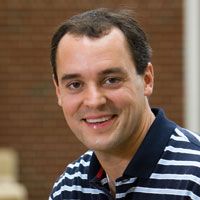Characklis to lead new NSF-USDA grant
August 8, 2014
Gregory Characklis, PhD, professor of environmental sciences and engineering at The University of North Carolina’s Gillings School of Global Public Health, will lead a team that has been awarded a $2.2 million grant from the National Science Foundation (NSF) and the U.S. Department of Agriculture (USDA).
The interdisciplinary, multi-institution project, “Designing Robust and Adaptive Water Management Strategies for Regions Transitioning from Abundance to Scarcity,” will develop innovative strategies for sustainably meeting future water demands in the Southeastern United States.
Characklis also is director of the Center for Watershed Science and Management in the UNC Institute for the Environment.
The Southeast faces a transition from abundance to scarcity due to population growth, economic expansion and limits on the development of new sources. Global climate change may exacerbate this situation, especially if the changes in land use that accompany development cause compounding effects. Characklis’ project will develop a simulation-based framework to design robust and adaptive regional water management strategies with broad relevance to the southeast and other regions in transition.
“Unlike water-scarce regions, such as the Western U.S., the infrastructure, legal and regulatory systems in the Southeast have developed in a manner that assumes an almost inexhaustible supply of water,” Characklis said. “An entirely new water-management paradigm is required to accommodate the new regional reality.”
The project will develop models that integrate engineering, economics and environmental concerns to analyze how climate change and land-use trends impact regional hydrology – and how infrastructure and regulatory systems will need to adapt. Central to this will be the use of a more flexible portfolio-based approach, involving many assets, including reservoirs, water reuse and conservation, to manage uncertainties associated with climate change and population growth. Much of the work will be conducted in North Carolina’s Research Triangle area (Raleigh/Durham/Chapel Hill) and will directly involve regional utilities and local governments.
The transdisciplinary project will include researchers from UNC’s College of Arts and Sciences, Institute for the Environment, and School of Government, as well as collaborators from Cornell University and the U.S. Forest Service.
“We have assembled a strong team,” Characklis said, “one that is uniquely qualified to develop water management strategies that will balance the region’s objectives to support both continued economic development and a high level of environmental quality.”
Gillings School of Global Public Health contact: David Pesci, director of communications, (919) 962-2600 or dpesci@unc.edu.

